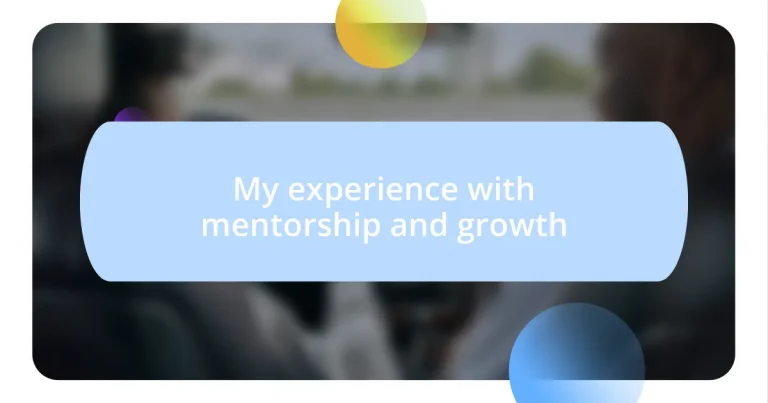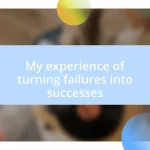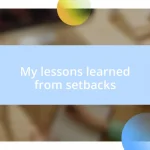Key takeaways:
- Mentorship provides invaluable support, guidance, and confidence, fostering personal growth and revealing new opportunities.
- Finding the right mentor involves aligning values, experience, communication styles, and commitment to ensure a productive relationship.
- Establishing clear goals and maintaining open communication strengthens the mentoring relationship and enhances accountability.
- Reflection and self-assessment are crucial for recognizing progress and understanding growth throughout the mentorship journey.
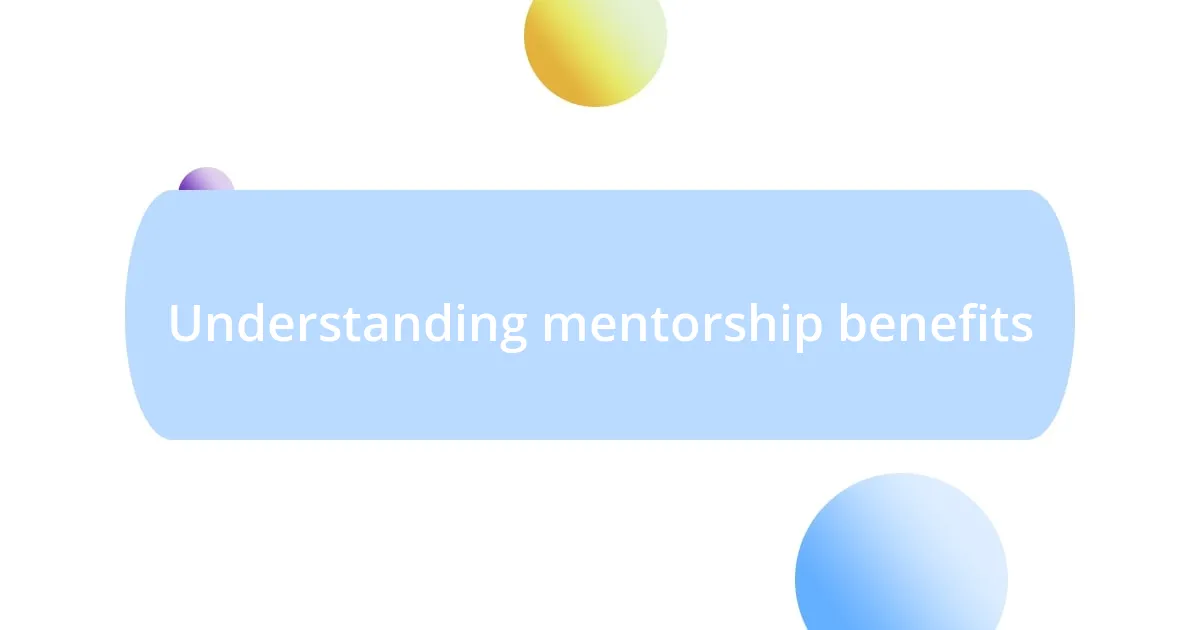
Understanding mentorship benefits
Mentorship can be a transformative experience, and I’ve seen firsthand how a mentor can provide invaluable guidance. I remember when I felt overwhelmed by a major project at work. My mentor stepped in, sharing not only strategies but also instilling confidence in my abilities. It made me realize that mentorship isn’t just about advice; it’s about feeling supported.
Have you ever felt lost in your career path? I know I have. What truly changed for me was having someone to offer perspective and challenge my thinking. My mentor encouraged me to step outside my comfort zone, which led to opportunities I never thought possible. This kind of support fosters personal growth and can illuminate paths that may not have been visible before.
Another benefit of mentorship is the network it can open up. One of my favorite moments was when my mentor introduced me to a colleague who ended up being a great friend and collaborator. This dynamic created a ripple effect, leading to new opportunities and connections. Isn’t it amazing how one relationship can expand your horizons significantly?
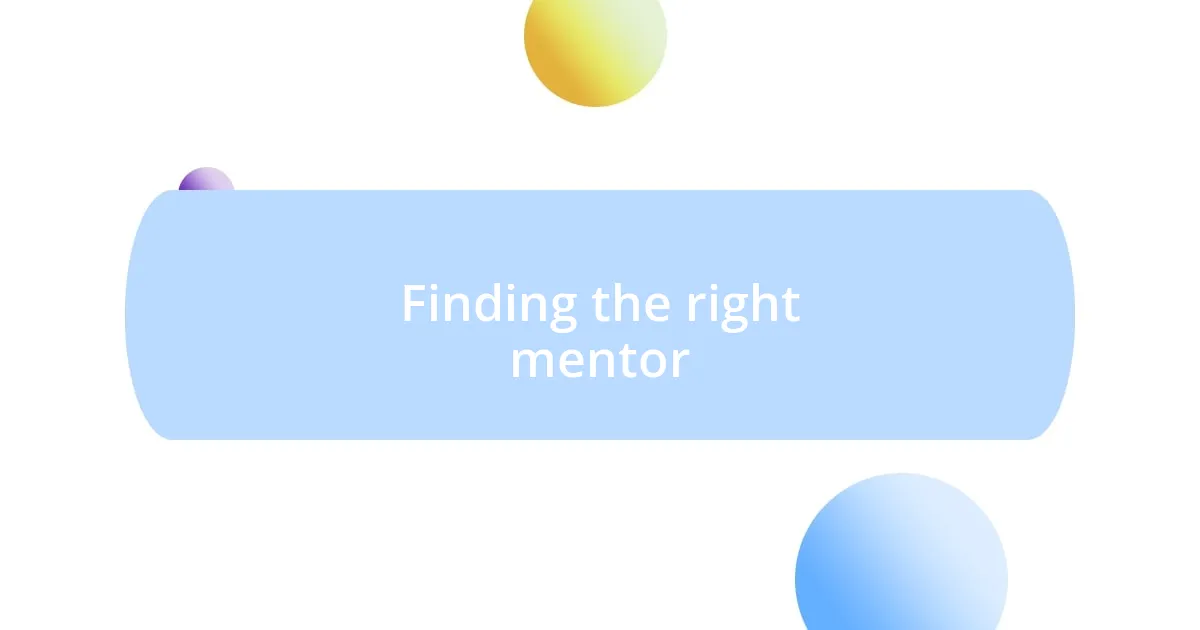
Finding the right mentor
Finding the right mentor is like discovering a hidden gem; it requires some exploration and instinct. I recall when I was searching for someone to guide me in my career. I had a list of qualities in mind: patience, experience, and a willingness to share. This process taught me that it’s essential to find someone whose expertise aligns with my goals while also resonating personally.
Here are some key points to consider when looking for a mentor:
- Shared Values: Look for someone whose values align with yours to create a strong foundation for your relationship.
- Relevant Experience: Seek out mentors who have walked a similar path or faced challenges you’re currently navigating.
- Communication Style: Find a mentor who communicates in a way that resonates with you, as effective dialogue is crucial for growth.
- Willingness to Invest Time: Choose someone who has the time and enthusiasm to dedicate to your development.
- Feedback Style: A mentor should provide constructive feedback that encourages reflection and growth, rather than criticism.
By reflecting on these aspects during my search, I found a mentor who not only believed in my potential but also challenged me in ways I hadn’t anticipated. It felt like having a guiding light, illuminating paths I was too hesitant to explore.
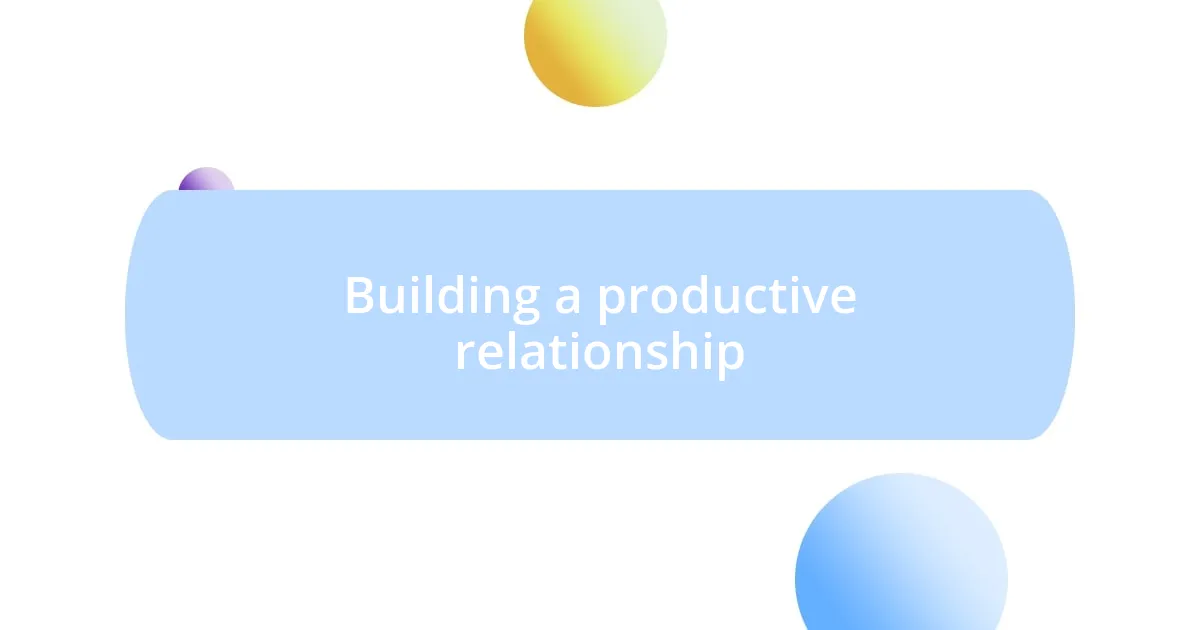
Building a productive relationship
Building a productive relationship with a mentor goes beyond just exchanging ideas; it’s about creating a safe space for honest dialogue and growth. I vividly remember sessions where I could express my fears and uncertainties, and my mentor would patiently listen, validating my feelings. This trust transformed our interaction into a powerful alliance where vulnerability was met with understanding, allowing me to tackle challenges head-on.
One valuable lesson I learned is the importance of setting clear expectations from the outset. Early on in my mentorship journey, I assumed we were on the same page, but I quickly realized we had different ideas of what our time together would look like. By openly discussing our goals and desired outcomes, we crafted a shared roadmap for success. This transparency not only strengthened our relationship but also ensured that both of us were committed to the journey.
A productive mentoring relationship also thrives on regular check-ins and feedback. Early in my experience, I noticed that I improved significantly whenever we scheduled consistent meetings to review my progress. These touchpoints kept me accountable and allowed my mentor to provide tailored guidance. It’s remarkable how a simple routine of open communication can elevate a relationship and lead to transformative growth.
| Key Elements | Importance |
|---|---|
| Trust | Establishes a safe environment for sharing challenges. |
| Clear Expectations | Aligns goals and creates a roadmap for the relationship. |
| Regular Check-ins | Keeps accountability and allows for tailored feedback. |
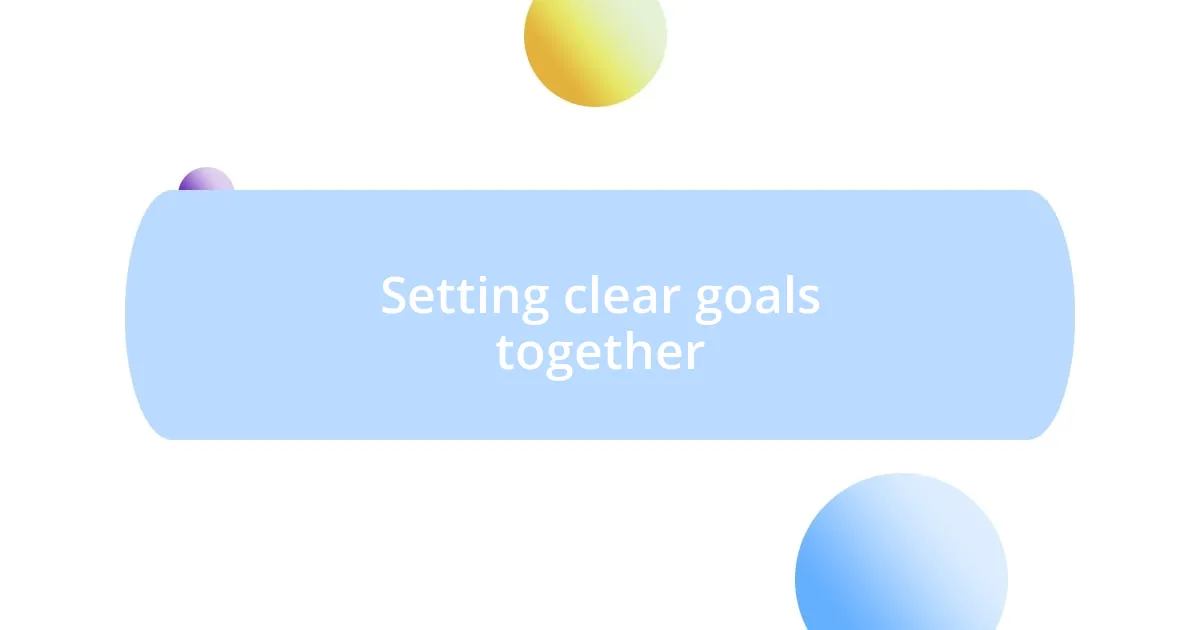
Setting clear goals together
Setting clear goals together is crucial in any mentoring relationship. I remember sitting down with my mentor for the first time, both of us sharing a blank canvas for our future. We took that moment to articulate what we wanted to achieve, pondering questions like, “What does success look like for me?” and “How can my mentor help guide that journey?” Those initial discussions were not just about outlining objectives; they created a shared vision that we could both rally around moving forward.
On another occasion, we revisited our goals a few months in, and I felt a rush of excitement as I realized how much progress I had made. I had always been someone who thrived on concrete benchmarks, so seeing this framework in action reinforced my motivation. It was a reminder that holding ourselves accountable to specific, measurable goals leads to tangible growth. Have you ever felt the same way, seeing your aspirations unfold right before your eyes?
The beauty of setting clear goals together lies in the collaborative effort. Not only did my mentor provide guidance, but we also tailored the objectives to fit my evolving aspirations. This fluidity in our approach empowered me to take risks and embrace change. It became evident that these goals were not just checkboxes; they transformed into stepping stones on my journey of growth and self-discovery.
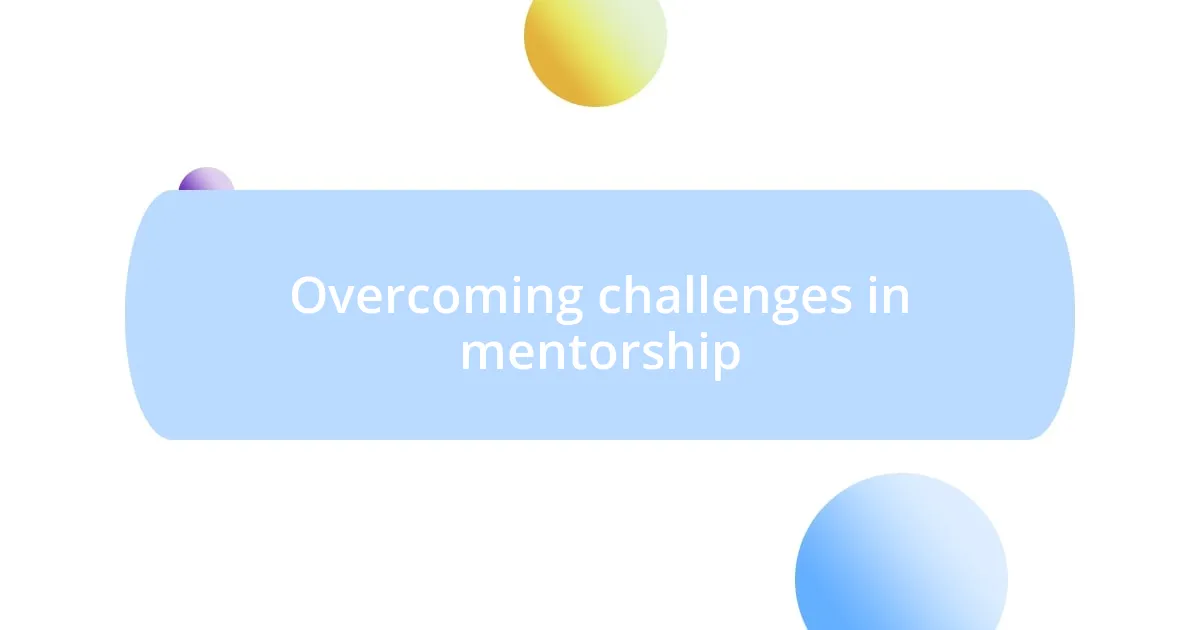
Overcoming challenges in mentorship
Overcoming challenges in mentorship often requires navigating misunderstandings. I recall a particularly frustrating moment when my mentor and I misinterpreted each other’s feedback. I felt defensive, believing my efforts were being undervalued, while my mentor aimed to push me beyond my comfort zone. Instead of letting tension build, we took a step back and addressed the miscommunication directly. By clarifying our intentions, we deepened our rapport and turned that hurdle into a learning opportunity.
Another significant challenge I faced was the fear of vulnerability. I remember one session where I hesitated to share a recent failure, worried it would reflect poorly on me. But as I mustered the courage to open up, I noticed a shift in our conversation. My mentor not only shared their own early career missteps but also emphasized that failure is a natural part of growth. It transformed my perspective; I realized that sharing struggles can actually strengthen the mentorship bond.
In my experience, adapting to change is a critical aspect of overcoming challenges. There was a time when my mentor experienced a significant life change, impacting our meetings. Initially, I felt lost and anxious about how our dynamic would shift. However, by being flexible and communicating openly, we adjusted our approach and found new ways to connect. This adaptability not only helped maintain our relationship but also taught me the value of resilience in the face of unforeseen obstacles. How have you adjusted to changes in your mentoring relationships?
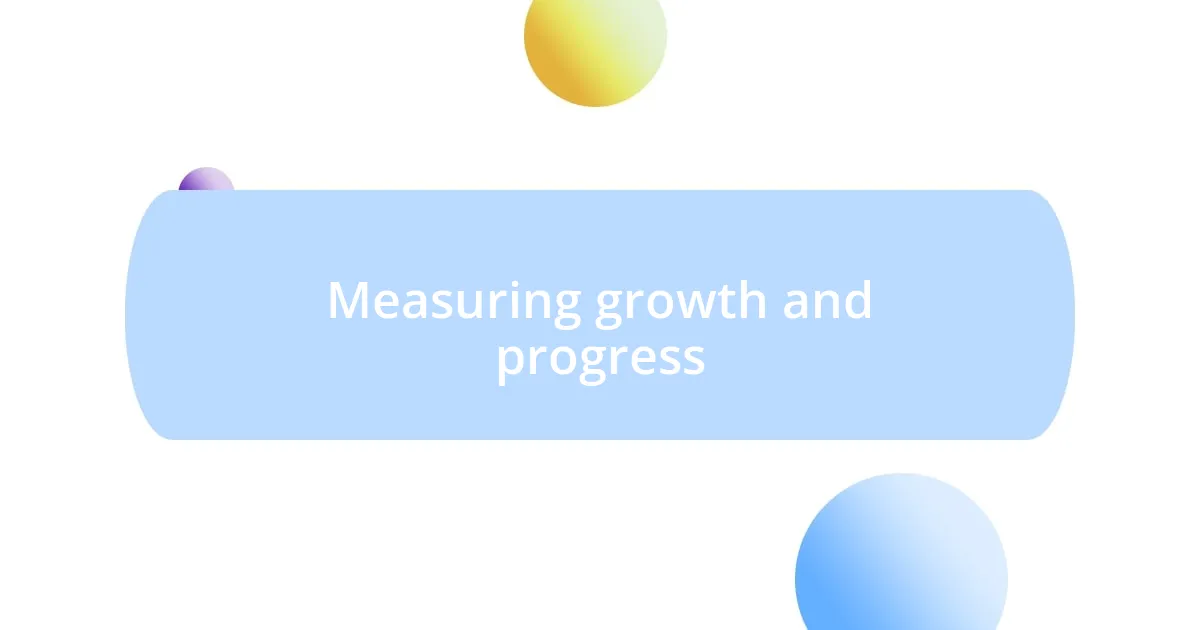
Measuring growth and progress
Measuring growth and progress in a mentorship can often feel like charting a course through uncharted waters. For me, one of the most enjoyable checkpoints was reflecting on feedback. I remember one review session when my mentor laid out a visual representation of my journey, highlighting the skills I had acquired. The sheer joy of seeing my improvement was undeniable. It made me think—how often do we truly take the time to recognize our own advancements?
Tracking milestones is more than just a numbers game; it’s about understanding the stories behind those milestones. I once had a moment when I realized that my confidence in public speaking had significantly improved. During a workshop, I delivered a presentation without the nervousness that once overwhelmed me. I still remember how liberating that felt—it wasn’t just about the applause; it was about recognizing my growth in a skill that had once intimidated me. Can you recall a similar breakthrough in your own journey?
One effective way I’ve measured progress is through self-reflection journaling. I started this practice a few months into the mentorship, and it turned out to be a game changer. I would write about my feelings after each session, noting what resonated with me or areas where I felt stuck. One week, looking back through my entries, I saw a clear trend of improvement in my decision-making skills. That realization was uplifting; it highlighted my evolution in a tangible way. Have you ever considered journaling as a method to gauge your own growth?
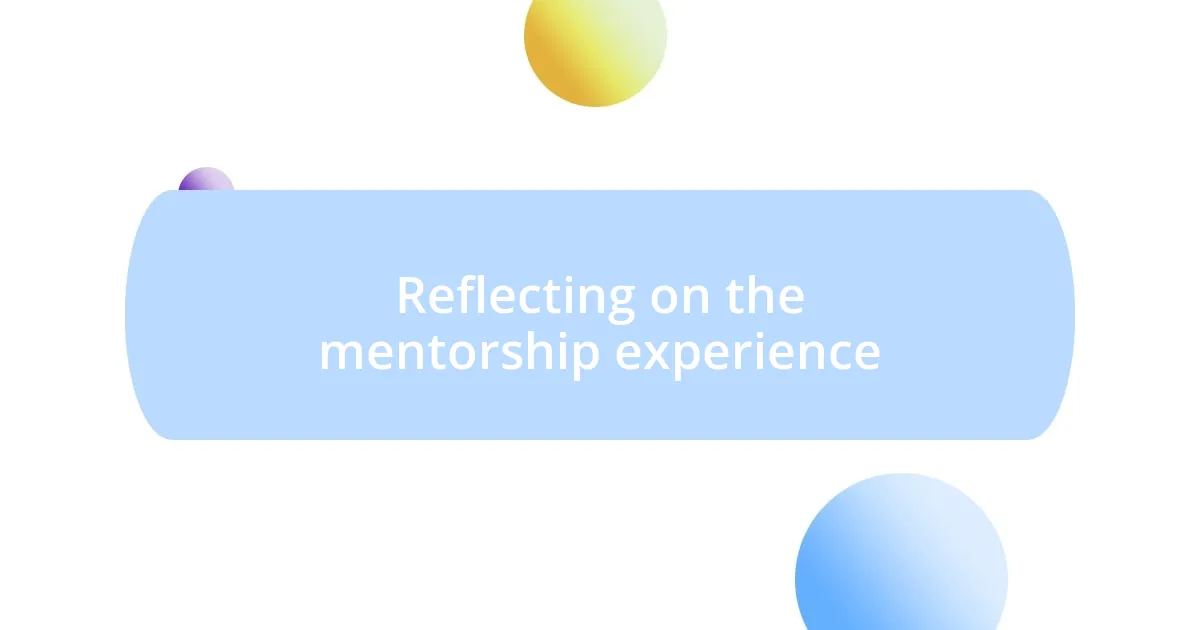
Reflecting on the mentorship experience
Reflecting on my mentorship experience often brings back vivid memories of transformative moments. One instance that stands out was the day my mentor pointed out an unexpected strength in my communication skills. I had always viewed myself as more of a behind-the-scenes person, but their encouragement made me feel seen in a new light. Have you ever experienced that moment when someone’s words change how you perceive yourself?
I’ve also realized that mentorship isn’t just about receiving guidance; it’s a two-way street. I remember a session where I shared insights with my mentor on emerging trends in our field. Despite their experience, they valued my perspective, which boosted my confidence immensely. This exchange made me appreciate the collaborative nature of mentorship—it’s not solely about learning; it’s also about contributing. How do you think your ideas might inspire those guiding you?
Throughout my journey, I found that reflection is crucial in understanding growth. After meaningful conversations, I jotted down the key takeaways in a notebook. I recall vividly one evening spent revisiting those notes and recognizing patterns in my thinking. It was as if the words became a mirror, revealing not just my progress but also the areas where I needed to focus. Have you taken the time to reflect on how far you’ve come? It can be a powerful exercise.












